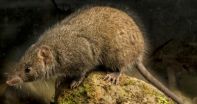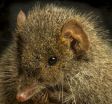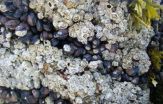(Press-News.org) A QUT mammalogist has discovered a highly sexed mouse-like marsupial in Queensland's Springbrook National Park.
The Black-tailed Antechinus was found in the high-altitude regions of the World Heritage Area.
It's the third new species in the genus Antechinus Dr Andrew Baker's research team has discovered in the past two years, all from south-east Queensland.
Dr Baker said he suspected the rare, Black-tailed Antechinus was a separate species when he and his team came across it last May because it had distinctive yellow-orange markings around its eyes and on its rump, and a black tail and feet.
"Comparing it to the Dusky Antechinus, which inhabits south-east Australia, we thought it was probably new," said Dr Baker, from QUT's Science and Engineering Faculty.
"We laid about 300 traps baited with peanut butter and oats.
"When we caught the first black-tailed antechinus in a trap, we knew we were onto something pretty special."
Dr Baker is now applying for an endangered species listing.
"Antechinus males and females are highly promiscuous; males mate for long periods of time with many females to promote their own genes," Dr Baker said.
"A single female's brood of young will typically be sired by several fathers.
"But during mating stress hormone levels rise dramatically, eventually causing the males' bodies to shut down. The males all die before their young are born."
The results of the team's studies have been published in the journal Zootaxa.
The Black-footed Antechinus is a coup for Dr Baker and his research partners from the Queensland Museum and Queensland Parks and Wildlife Service.
New mammal discoveries are rare, with only a handful typically discovered in the world each year.
Dr Baker said the Black-tailed Antechinus likely won't be the last unique creature to be unearthed in Springbrook National Park.
"The Gondwanaland rainforest relic at Springbrook is special and unique," he told the Gold Coast Bulletin.
"It would not surprise me if there are other animals that are new in that area. Such things are about place not species."
INFORMATION: END
Newly discovered marsupial the victim of fatal attraction
2014-02-21
ELSE PRESS RELEASES FROM THIS DATE:
Degradation of viral DNA in the cell nucleus is opening up new treatment
2014-02-21
Viruses such as HBV can persist by depositing their genetic information (DNA) in the cell nucleus, where the DNA is normally not degraded. This prevents antiviral drugs from eliminating these viruses. But the newly discovered mechanism could make this possible without damaging the infected cell in the liver. In the current issue of the prestigious journal 'Science', the scientists report that now new therapeutic possibilities are consequently opening up.
Although preventive vaccination is possible, the World Health Organization (WHO) reports that more than 240 million ...
Microparticles show molecules their way
2014-02-21
This news release is available in German. A team of researchers of Karlsruhe Institute of Technology (KIT) and the University of Michigan/USA has produced novel microparticles, whose surface consists of three chemically different segments. These segments can be provided with different (bio-) molecules. Thanks to the specific spatial orientation of the attached molecules, the microparticles are suited for innovative applications in medicine, biochemistry, and engineering. The researchers now report about their development in the journal Angewandte Chemie.
"Microparticles ...
Optimising custody is child's play for physicists
2014-02-21
Physics can provide insights into societal trends. Problems involving interactions between people linked in real-life networks can be better understood by using physical models. As a diversion from his normal duties as a theoretical physicist, Andrés Gomberoff from the Andres Bello University in Santiago, Chile, set out to resolve one of his real-life problems: finding a suitable weekend for both partners in his recomposed family to see all their children at the same time. He then joined forces with a mathematician and a complex systems expert. This resulted in a study ...
Team sport compensates for estrogen loss
2014-02-21
When women enter menopause, their oestrogen levels taper. This increases their risk of cardiovascular disease. New research from University of Copenhagen shows that interval-based team sport can make up for this oestrogen loss as it improves their conditions, reduces blood pressure and thereby protects the cardiovascular system.
While aging and an array of physical transformations go hand in hand for all, menopause has a significant influence on physical changes in women. Oestrogen, the primary female sex hormone, is an important guardian of the female vascular system. ...
Enzalutamide: IQWiG assessed data subsequently submitted by the manufacturer
2014-02-21
Enzalutamide (trade name: Xtandi) has been approved since June 2013 for men with metastatic prostate cancer in whom the commonly used hormone blockade is no longer effective and who have already been treated with the cytostatic drug docetaxel. In an early benefit assessment pursuant to the Act on the Reform of the Market for Medicinal Products (AMNOG) in November 2013, the German Institute for Quality and Efficiency in Health Care (IQWiG) determined an added benefit of this new drug over the appropriate comparator therapy specified by the Federal Joint Committee (G-BA). ...
What has happened to the tsunami debris from Japan?
2014-02-21
The amount of debris in the ocean is growing exponentially, becoming more and more hazardous and harmful to marine life and therefore also to our ocean food source. Measuring and tracking the movements of such debris are still in their infancy. The driftage generated by the tragic 2011 tsunami in Japan gave scientists Nikolai Maximenko and Jan Hafner a unique chance to learn about the effects of the ocean and wind on floating materials as they move across the North Pacific Ocean.
Shortly after the tsunami struck, Maximenko and Hafner used the IPRC Ocean Drift Model ...
Temperature and ecology: Rival Chilean barnacles keep competition cool
2014-02-21
PROVIDENCE, R.I. [Brown University] — Here are two facts that make the lowly barnacle important: They are popular models for ecology research, and they are very sensitive to temperature. Given that, the authors of a new study about a bellwether community of two barnacle species in Chile figured they might see clear effects on competition between these two species if they experimentally changed temperature. In the context of climate change, such an experiment could yield profound new insights into the biological future of a major coastline that is prized for its ecological, ...
Schizophrenics are at greater risk of getting diseases
2014-02-21
Researchers have long known that people with autoimmune diseases, such as hepatitis, type 1 diabetes, multiple sclerosis and psoriasis, are at greater risk of developing schizophrenia.
But new research based on data sets covering the majority of the Danish population shows that the development goes both ways: People suffering from schizophrenia also have an increased risk of contracting autoimmune diseases, especially if they have suffered from a severe infection.
Head of the new study is Michael Eriksen Benrós, MD and PhD, who is senior researcher at the National ...
Early warning system for epidemics
2014-02-21
Cholera has been all but eradicated in Europe, but this bacterial, primarily waterborne disease still claims thousands of lives in Africa every year. Scientists are examining the effects various environmental factors have on cholera epidemics in Uganda. As part of this work, the Fraunhofer Institute of Optronics, System Technologies and Image Exploitation IOSB in Karlsruhe developed a software architecture for early warning systems that compares environmental and health data and presents the results graphically. "This allowed us to visualize the complex relationships between ...
The parasite that escaped out of Africa
2014-02-21
PHILADELPHIA - An international team of scientists has traced the origin of Plasmodium vivax, the second-worst malaria parasite of humans, to Africa, according to a study published this week in Nature Communications. Until recently, the closest genetic relatives of human P. vivax were found only in Asian macaques, leading researchers to believe that P. vivax originated in Asia.
The study, led by researchers from the Perelman School of Medicine at the University of Pennsylvania, found that wild-living apes in central Africa are widely infected with parasites that, genetically, ...






